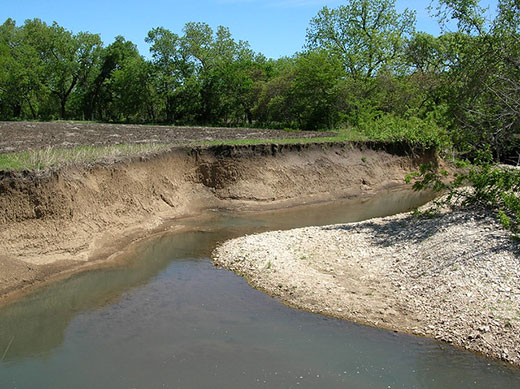
Kansas 4-H youth have received training to teach lessons about water quality, funded by a grant from the National 4-H Council and Bayer Corporation. (File photo)
4-H youth launch program to teach about water quality
‘Water Connects Us All’ is part of Ag Innovators Experience grant
August 25, 2020
MANHATTAN, Kan. – Nearly two dozen Kansas 4-H members have taken it upon themselves to educate residents in their local communities about their role in protecting nearby waterways.
Their message: Many things we do in our yards and businesses affect the quality of water in our community.
“It’s been eye-opening for these kids to see how industry and homeowners in cities can implement practices to help with runoff coming off our parking lots and streets or coming out of a factory,” said Cheri Nelsen, a Kansas 4-H youth development agent in the Wildcat Extension District in southeast Kansas.
Listen to an interview by Jeff Wichman with Cheri Nelsen on the radio program, Agriculture Today
In late 2019, Nelsen and representatives from six other states landed a grant from the National 4-H Council and Bayer Corporation to lead a project called the 4-H Ag Innovators Experience. In February, she and a volunteer accompanied three Kansas team leaders to training at Iowa State University, where they were given a challenge to reach 1,000 youth with a program titled ‘Water Connects Us All.’
“They showed us all of the various watersheds across the United States,” Nelsen said. “We live in the largest watershed in the country, the Mississippi watershed. All of that water from north to south runs to the Gulf of Mexico.”
Nelsen said the youth learned that pollutants from runoff can cause hypoxic zones in waterways, or conditions where the concentration of oxygen is so low that very few organisms can survive. These areas are also called ‘dead zones.’
Armed with their new knowledge, and a curriculum to match, the youth had plans to bring the message to their communities and their peers. Then, the COVID-19 pandemic hit.
“We were ready to go out and teach after-school programs and had all these things ready to do this spring and summer, and then we couldn’t do anything,” Nelsen said.
So far, the youth have given a virtual presentation during the 4-H Discovery Days in late May, and recently taught part of their curriculum at county fairs in Wilson and Crawford counties. A few youth have created videos teaching parts of the program. They hope to offer after-school programs this fall, and to take advantage of field days hosted by local conservation groups.
“The big thing we want to get across is that soil is like a sponge,” Nelsen said. “With a wetland project, if you have certain types of soil, it will act like a sponge to collect nitrates and other pollutants to prevent them from getting into our water.”
The lessons include teaching about such pollutant-absorbing engineering techniques as building a bio-reactor, bio-swails, saturated buffers or a rain garden.
“The rain garden, in particular, is something any of us can do in your yard at home to help with runoff coming off your lawn,” Nelsen said.
Rain gardens rely on plants or a naturally-engineered soil or medium to retain stormwater and filter pollutants – such as fertilizer or weed chemicals -- carried by water runoff.
“These are the types of things all of us can do, even though we are just one person, to protect somebody down the line – or down the stream, you might say. The kids have really enjoyed learning about that.”
The 4-H Ag Innovators Experience was developed to help youth apply critical thinking and STEM skills to a real-world agriculture challenge. In recent years, Kansas 4-H members have taught lessons on improving the habitat for Monarch butterflies, and the importance of native bees as pollinators and their relationship to agriculture and the food we eat.
Learn more about opportunities available through Kansas 4-H online.

